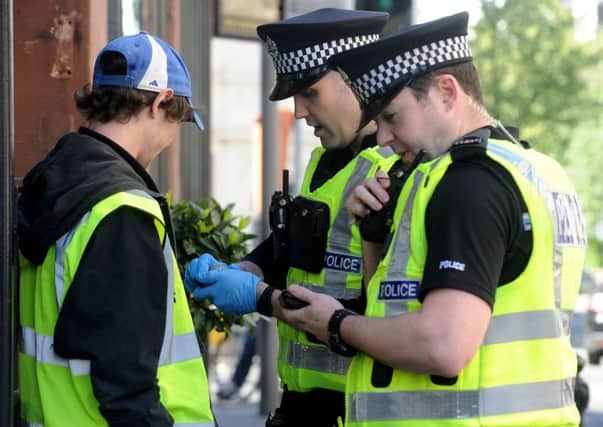Police stop-and-search to tackle ‘legal highs’


The so-called party drugs are being seized by officers in the Capital on a regular basis before being sent for analysis.
Chief Superintendent Mark Williams, Edinburgh’s most senior police officer, said it was an “effective tactic” to tackle the “dangerous” substances.
Advertisement
Hide AdAdvertisement
Hide AdHe spoke to the Evening News as figures revealed that the number of successful stop-and-searches in the Capital had soared by 30 per cent.
More items – including legal highs, weapons and fireworks – were seized between April and September last year in comparison with the same period in 2013, despite the overall number of stop-and-searches dropping by nearly a fifth, from 23,660 to 19,142.
A report for the council’s police and fire scrutiny committee attributes the trend to an “increasing prevalence” of the stimulants, known as New Psychoactive Substances (NPS).
Ch Supt Williams said: “When we find somebody in possession of it, we seize it and record it as a positive stop-and-search and send it for analysis.
“The legal high element is a real misnomer. People assume that it’s legal and it’s safe – but it’s incredibly dangerous.”
Health authorities have previously told how NPS use was putting an unprecedented strain on resources, but the highs are difficult to control due to their dubious “legal” status and accessibility from local shops.
Ch Supt Williams added: “Stop-and-search is still an effective police tactic that we use throughout the city.
“People are suffering huge health issues and putting themselves in really vulnerable positions. We are very concerned.”
Advertisement
Hide AdAdvertisement
Hide AdSouthside/Newington councillor Jim Orr, who has called for tougher legislation on NPS, said: “It is encouraging that the police are using stop-and-search to ensure that sachets contain what users think they do. This at least makes the supply safer, and means that illegal substances should be detected.”
The report also reveals that police managed to solve 74 per cent of robberies over the same period – a record detection rate.
However, there was a 13.6 per cent hike in the number of robberies in that timescale, up from 213 cases to 242. More than half of these were street robberies, while almost a quarter were in homes and “private spaces”.
Ch Supt Williams said the spike was down to a change in the way crimes were recorded, set by the Scottish Crime Recording Standards.
He said: “In a case where six people have been walking and two individuals have presented a knife to them and demanded their phones, that would equate to six robberies. Last year it would have counted as one robbery with six complainers.”
The report also reveals that offences involving drugs supply dropped by 43.9 per cent in comparison with 2013, while drugs possessions convictions were up 21.5 per cent.